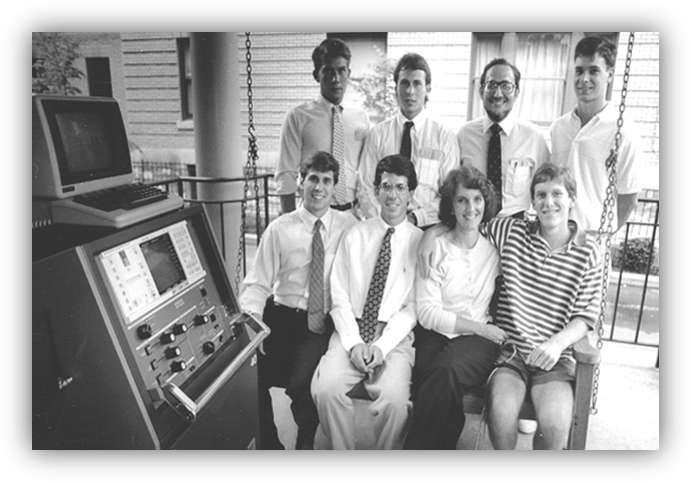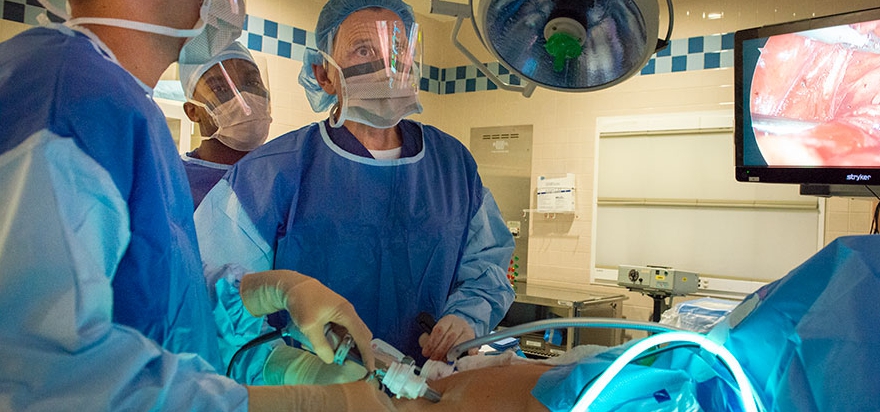The University of Pittsburgh School of Medicine Department of Cardiothoracic Surgery is committed to delivering integrated care defined by outstanding clinical outcomes, cutting edge technology, world class research and scholarship, and educating surgical leaders of the future.
Our rich cardiothoracic surgery legacy dates back to 1963, when the Hopkins-trained mentee of Dr. Alfred Blalock, Henry "Hank" T. Bahnson, MD, was recruited to the University of Pittsburgh to serve as the second Chair of the Department of Surgery. Serving as Chair until 1987, Dr. Bahnson is credited for the vision to recruit Dr. Thomas Starzl to the University of Pittsburgh. Dr. Starzl would go on to redefine the field of organ transplantation by introducing immunosuppression drugs.

With Dr. Bahnson's leadership and unwavering commitment to innovation, the University of Pittsburgh emerged as one of the world's premier centers for cardiothoracic transplantation. Notable milestones include performing the region's first, and the world's second, successful heart-lung transplant (1982), performing the world's first heart-liver transplant (1984), and implanting the nation’s second Jarvik Artificial Heart is implanted as a bridge-to-transplant (1985), performing the world's first heart-liver-kidney transplant (1989), and discharging the first patient to home in the world with a ventricular assist device (1990). Talented cardiothoracic surgeons including Dr. Bartley P. Griffith, Dr. Brack G. Hattler and Dr. Robert L. Kormos flocked to Pittsburgh to flourish in this environment, partnering with local bioengineers to further advance cardiothoracic transplant through their contributions to mechanical circulatory support and the development of the total artificial heart.

In 1994, Dr. James D. Luketich was recruited to join the Division of Cardiothoracic Surgery in the Department of Surgery. He would go on to pioneer the minimally invasive esophagectomy, performing what had been a morbid, open esophagectomy operation laparoscopically with outstanding results. Although met with initial skepticism, Dr. Luketich demonstrated the superiority of the minimally invasive approach time and time again, and by the mid-2000s the University of Pittsburgh was widely regarded as the premier center for esophageal surgery in the United States. In 2010, Dr. Luketich was named Founding Chair, and the University of Pittsburgh Department of Cardiothoracic Surgery was established.
Over the past 13 years, the Department has remained at the forefront of clinical excellence, research, scholarship, and education. Many of today's leading cardiothoracic surgeons including Dr. Ronald Pellegrini, Dr. James Gammie, Dr. Kenneth McCurry, Dr. Christian Bermudez, Dr. Thomas G. Gleason, Dr. Vinay Badhwar, Dr. Virginia Litle, Dr. Peter Wearden, and more have spent time in Pittsburgh throughout their careers.
In 2023, Dr. Victor O. Morell was named the second Chair of the Department of Cardiothoracic Surgery at the University of Pittsburgh School of Medicine. Alongside Division Chiefs Dr. Ibrahim Sultan (Division of Cardiac Surgery), Dr. Ryan M. Levy (Division of Thoracic and Foregut Surgery), and Dr. Pablo G. Sanchez (Division of Lung Transplantation), the Department looks forward to honoring our legacy and building our future defined by excellent clinical outcomes for all the diverse communities we serve, and assuring the next generation of cardiothoracic surgeons and scientists is well equipped to continue this important mission.

